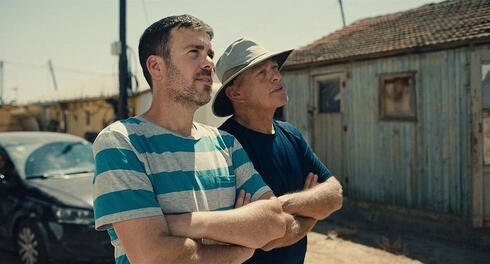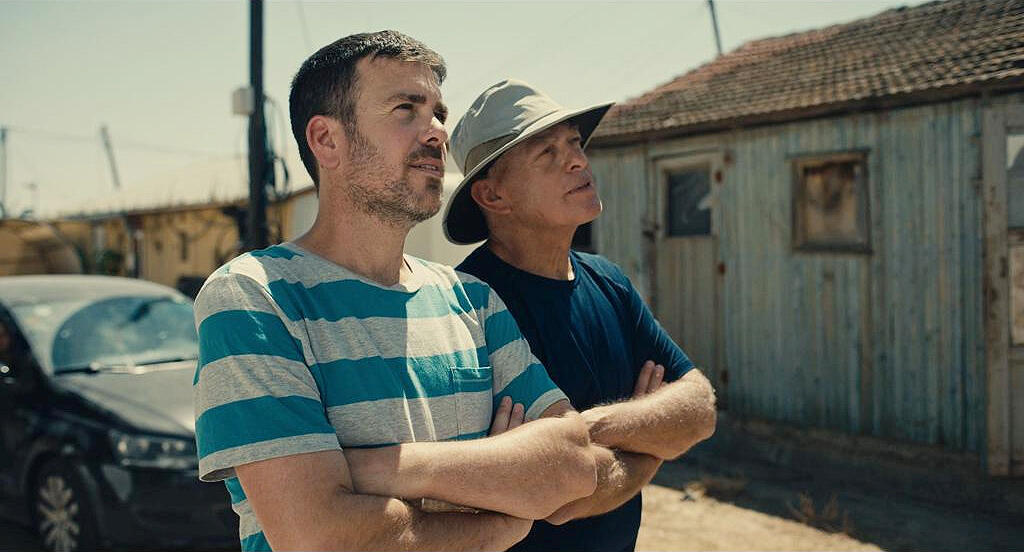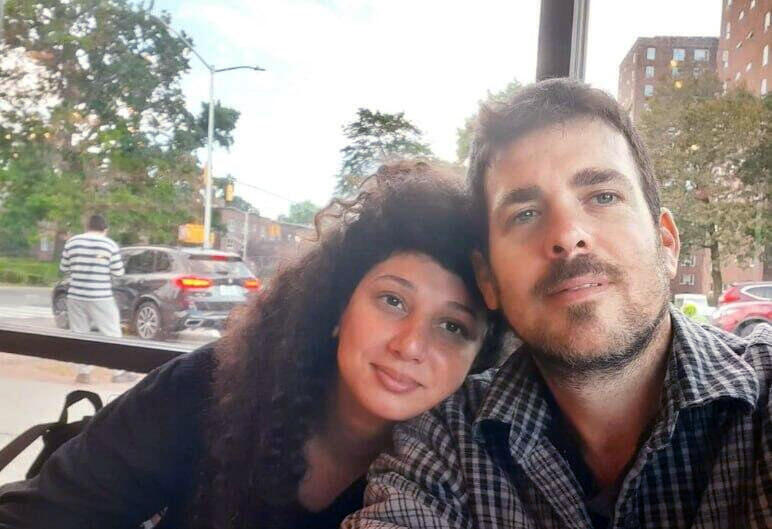
ISRAEL AT WAR
Real life horror film: Israeli director, actors murdered by Hamas
Talented director Yahav Wiener from Kibbutz Kfar Aza was murdered last week by Hamas after saving his wife and infant daughter. Now his full-length debut film, which was shot entirely on the kibbutz and features kibbutz members who were killed, will become a painful memorial to a world that has been destroyed. "The kibbutz was one big film studio for us," says the producer. "Now it's all gone"
For two weeks last July, Kibbutz Kfar became a movie studio. The film shot there is called "Haggadat Kibbutz", which takes place around Passover. This is the first feature film by the late director and screenwriter Yahav Wiener, who last week was one of more than 1,300 people murdered by Hamas terrorists. Wiener was murdered in the kibbutz where he lived, which was the inspiration for his film. Wiener and his partner, Shi-Li Atari, were at their home in the kibbutz with their one-month-old daughter, Sheya, when terrorists tried to enter their bomb shelter. Wiener held the handle of the escape window, to prevent the terrorists from entering, and allowed Atari to escape with their daughter, and find shelter in a nearby warehouse and thus be saved almost a day later. Three days later his body was found. He was 37 years old when he died.
2 View gallery


Yahav Wiener, murdered by Hamas, with his father Ofer in his new movie
(Photo: Ben Peled)
A month before the filming of the feature film, Wiener's final short film entitled “Hayeled” (The Boy) - took part in the Tel Aviv International Student Film Festival where it won the cinematography award. This month Wiener was supposed to fly to the Munich Film Festival to screen his short film. I saw Hayeled at the Tel Aviv festival and that's how I recognized Wiener’s name when word of his murder became known. The short film was also shot in Kfar Aza. It opened with a long and beautiful shot, the first in a series of long and stylish shots that deservedly won the cinematographer, Ben Peled, the award.
The shot starts at sunrise over the kibbutz fields adjacent to the perimeter fence between Israel and Gaza. In the middle of the field, a damaged irrigation pipe starts spraying water. First in a small way. But as time goes on, the stream turns into a huge fountain of water, until the kibbutz vehicle enters the frame, with the person in charge of the irrigation system sitting in it. Yoram Toledano plays him and he comes to repair the pipe with his 25-year-old son, who suffers from post-traumatic stress disorder. The son is not willing to take his pills, and the father is not willing to hospitalize him. The son (played by Nimrod Peleg) looks through the binoculars at the lights of Gaza City in infinite pain. Indeed, at the next red alert, in the midst of a barrage of shells from the Gaza Strip, he tries to cross the border.
"I remember how I helped Yahav fight for this shot, the look through the binoculars towards Gaza," recalls Keren Yedaya, who was Wiener's screenplay mentor at Minshar Film School. "I remember him describing to me how important it was to him." Yedaya remembers Yahav as a remarkable and diligent student in his class: "He was a true prince, beloved, talented, and only wanted to help everyone. He was generous and a fighter for justice." He dedicated Hayeled to the memory of the late Jimmy Kadoshim, a resident of Kfar Aza who was killed by a rocket in 2008. "His final film was his cry to the place from which he came, to the landscape, to the beauty, to the people, and to the endless pain in the never-ending circle of blood."
The news about the massacre in Israel was received by Yedaya in the western United States, where she moved with her husband, the director Meni Yaesh, and their children about a month ago, in an attempt to check options in the American film industry. Yaesh meanwhile returned to Israel to complete work on the next episodes of his TV series, Border Police (Mishmar Hagvul). When the surprise attack by Hamas happened, they decided that it would be better for Meni to stay in Israel to support his family and help in whatever he could.
Related articles:
- "For every fallen soldier, for every murdered civilian, let’s put together a new innovative startup," says entrepreneur Izhar Shay, whose son was killed by Hamas
- Kfar Aza plastics company hoping to return to activity after murder of three team members by Hamas
- ISRAEL AT WAR: Over 1300 murdered, dozens of civilians taken hostage, in surprise Hamas attack
Yedaya's connection to the family of Wiener and Atari goes deeper than being an advisor for the script. Yedaya is Atari's mentor in the ‘Big Sister’ project, in which young female creators are paired with experienced directors to help develop their projects. "Shay-Li chose me to be her big sister, and she wrote a letter that she wants to learn from me how to be brave. When I heard about the horror that happened to her and her baby on that horrible Shabbat in Kfar Aza, and about Yahav the hero, and how she managed to save both of their lives - I thought it was clear who was the brave one between the two of us," Yedaya says painfully.
On that Saturday morning, Yedaya texted Atari to check how she was doing, as she also did with her students from Sapir College in the same region. But she did not receive an answer from Atari and did not know what had happened until the news reached her through the director and editor Asaf Korman and his actress wife Liron Ben-Shlush, Yahav Wiener’s cousin.
2 View gallery


Shay-Li Atari and her husband Yahav Wiener who fell in the battle against the terrorists in Kfar Aza
Wiener and Atari met at the Nissan Nativ Acting Studio. Atari moved there after stopping her music studies at Ramon and following a personal tragedy retired from the music business (she is also the niece of Israeli singer Gali Atari). From Nissan, Nativ Atari moved on to film studies at the Steve Tisch Film School at Tel Aviv University, and her student film "Youth" (Neurim) was accepted into the Cannes Film Festival's student competition. Wiener went on to film studies at Minshar, and after his studies, he started working as the production coordinator of the film department of Sapir College, which is 10km away from his home.
And so, even before his final film saw the light of day, Wiener was already running ahead to create his first feature film. Wiener wanted to approach the Negev Foundation's Young Creators Incubator, and even though it offered a meager production budget, he sought to enlist the producer Aviv Ben Shlush (who produced Erez Tadmor's successful films ‘Besorot Tovot’ and ‘Bachurim Tovim’), the brother of Liron Ben Shlush and his cousin. "Last July, Yahav called me and asked if I would do it with him, even though it's an incubator for young producers and creators with a limited budget," says Ben Shlush. "I said I would be happy to. Yahav simply wrote a script from scratch in three months. It was clear to me that we would receive the first prize in the incubator. The script, about a young couple who returns to the kibbutz in an attempt to recover from their broken dreams, was so organic and suitable for this place and Yahav had a huge drive to do it."
They did win first prize. Then the deliberation began on when to shoot. Wiener and Atari were expecting the birth of their first daughter and simple logic said they would wait to make the film, in which they both play the main roles, till after the birth. But Wiener didn't have time to wait for that. "I wanted to postpone until after the birth, that is, till this October-November, but Yahav and Shay-Li thought it would be right to shoot in June, two months before the birth so that they would finish with this project before moving on to the baby girl project.
"Due to the small budget and thanks to the fact that Yahav is from the kibbutz, we decided to cast inexperienced actors from the kibbutz for most of the characters in the film. Yahav and Shay-Li in the main roles, and Shay-Li also cast the film. Ofer Wiener, Yahav's father, plays the father in the film. The real characters Yahav based the story on played themselves," adds Ben Shlush. The main location in the film is the house of Wiener and Atari, the house where he was murdered.
Atari, who is also a gifted editor, began editing the film in recent weeks. "Yahav won't be able to finish editing the film anymore," says Ben Shlush. "The paths and places we filmed in the kibbutz no longer exist, some of the supporting characters and extras who appeared in the film were murdered, and the kibbutz we knew no longer exists. The kibbutz opened its doors and we suddenly had one big film studio. Yahav and I laughed that this was probably the last time the kibbutz would allow filming with all the fuss we caused."













